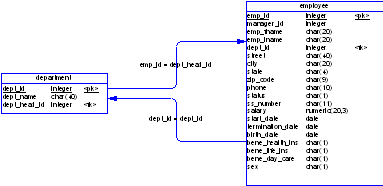







UltraLite Database User's Guide
Synchronization for UltraLite Applications
Designing synchronization for your UltraLite database
This section describes a specific limitation in UltraLite synchronization that results from a series of tables linked together by foreign keys so that a cycle is formed.
MobiLink synchronization from an UltraLite remote database requires that all changes be committed to the consolidated database in one transaction. To facilitate this single transaction for multiple tables, the inserts, updates, and deletes for each table must be ordered so that operations for a primary table come before the associated foreign table. This ensures that the insert in the foreign table will have its foreign key referential integrity constraint satisfied (likewise for other operations like delete).
The UltraLite analyzer automatically orders all the tables in the remote database so those primary tables are uploaded before foreign tables based on the schema in the reference database. The ordering is always possible as long as there are no foreign key cycles in the schema.
The figure illustrates a simple foreign key cycle between two tables.

If a foreign key cycle is detected by the UltraLite analyzer, the cycle must be broken for the analyzer to successfully complete without any errors. The foreign key cycle must be broken on both the reference database and the consolidated database in order for synchronization transactions to be successfully applied.
For an Adaptive Server Anywhere consolidated and reference database, one of the foreign keys can be made to check on commit so that foreign key referential integrity is checked during the commit phase rather than when the operation is initiated. Other database vendors may have similar methods but if not, the schema must be redesigned to eliminate the foreign key cycle.
create table c (
id integer not null primary key,
c_pk integer not null
);
create table p (
pk integer not null primary key,
c_id integer not null,
foreign key p_to_c (c_id) references c(id)
);
alter table c
add foreign key c_to_p (c_pk)
references p(pk)
check on commit;


